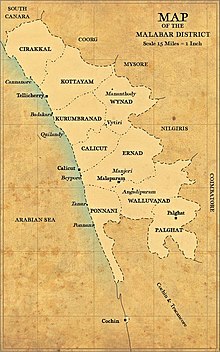Venniyour revolt
The verifiability of the claims made in this article is disputed. (November 2024) |
| Venniyour Revolt | |||||
|---|---|---|---|---|---|
 Map showing Ernad | |||||
| |||||
Venniyour revolt, also known by names such as Venniyour Uprising was a Muslim revolt against the landlord-British alliance that took place in Venniyour near Thirurangadi, Malabar district in 1843. Extensive studies have been conducted on the Mappila Muslim uprisings in Malabar, often interpreted as emotional outbursts of a community, communal riots by religious fanatics, or agrarian revolts by the oppressed peasantry, victims of feudal power. Among these, the Venniyour war stands out.
Background
[edit]The Kaprat Panickers were an ancient landlord family from Venniyour near Tirurangadi, dating back to the 11th century when they were considered commanders under the Vellatiri kings, later serving as commanders for the Zamorin.[1] By 1843, the head of the Kaprat family was Krishnapanicker, a staunch traditionalist who maintained social hierarchies and customs rigorously, with a large retinue of subordinates.
The spark for the Venniyour revolt was ignited by a low-caste woman named Chakki (also known as Chirutha), who worked as a domestic servant in the Kaprat household. Orphaned at a young age, Chakki contracted a persistent skin ailment, which did not improve despite numerous traditional treatments. Desperate, she decided to seek the help of Sayyid Alavi of Mampuram, a revered Muslim scholar and healer. Sayyid Alavi, without discrimination, listened to her plight and provided her with a remedy, which miraculously cured her within two weeks.[2]
Moved by the egalitarian treatment she received from Sayyid Alavi and her newfound faith, Chakki, along with six other subordinates, converted to Islam.[3] Chakki took the name Ayesha, while the others adopted Islamic names as well. The conversion and the newfound freedom to choose dignified names,that came with Islam.The Out caste Avarnas only had roght to choose name s of crawlers.[4]such as the right to cover her body and practice the rituals of the faith—empowered Ayesha and her peers.
Ayesha continued working at the Kaprat household, but her new identity and the attire that came with it did not sit well with Krishnapanicker. When Ayesha, dressed in her Islamic clothing, entered areas of the household previously off-limits to her as a low-caste servant, Panicker reacted violently. He tore off her clothing, threw her to the ground, and assaulted her, enraged that a former low-caste woman dared to defy social norms.
Aftermath
[edit]Deeply wounded and humiliated, Ayesha fled to Mampuram, seeking Sayyid Alavi’s help. The scholar, who had previously been on friendly terms with Krishnapanicker, was appalled by the violence inflicted upon Ayesha. Realizing the gravity of the situation and the potential for broader social unrest, Sayyid Alavi blessed the seven rebels, who were ready to fight and become martyrs.[5][6]
On 10 October the rebels gathered under the leadership of Sayyid Alavi, reciting verses of martyrdom before embarking on their mission. Despite efforts by the British authorities to quell the unrest, including removing Panicker from his position, the Mappilas refused to pay taxes, leading to further escalations.
On 18 October Panicker's assistant steward Nair was found murdered. British records show that Alavi's followers were not behind these events. On 19 October 1843 (Ramzan 26) a six-member group of Mappila fighters, who were waiting for an opportunity, broke into the shrine of Kaprat Panikkar and chased away the guards and beheaded panicker.[7] After the murder, the rebel group came out of Kovilakam and challenged the Nair police and revealed their names. They were later defeated by the Colonial forces with great casuality from the part of British.
References
[edit]- ^ 1.malayalethile janmimar (Jenmis in Malayalam) written by K.C.M. Raja and Krishna Warrier published in 1907 or 1908
- ^ 2.Mamrnad Kutty and Muhiyudheen, cherur padapattu
- ^ Letter from H.V. Conolly to J.F. Thomas, Secretary to Govt., Judicial Dept. dated 30th Oct 1843, Calicut, No.27/43, C M 0, vol.11, p.97.
- ^ Caste System and Kerala History-PK Bala Krishnan
- ^ Mamborum Tangal: Life, Spirituality, Struggles of Mamburam Ali Husseini Ba Alawi- Mahmood Panangangara
- ^ K.N. Panikkar- Against Lord and State; Religion and Peasant Uprisings in Malabar 1836–1921.
- ^ W.Logan, Malabar Manual Vol.1 p.626.
